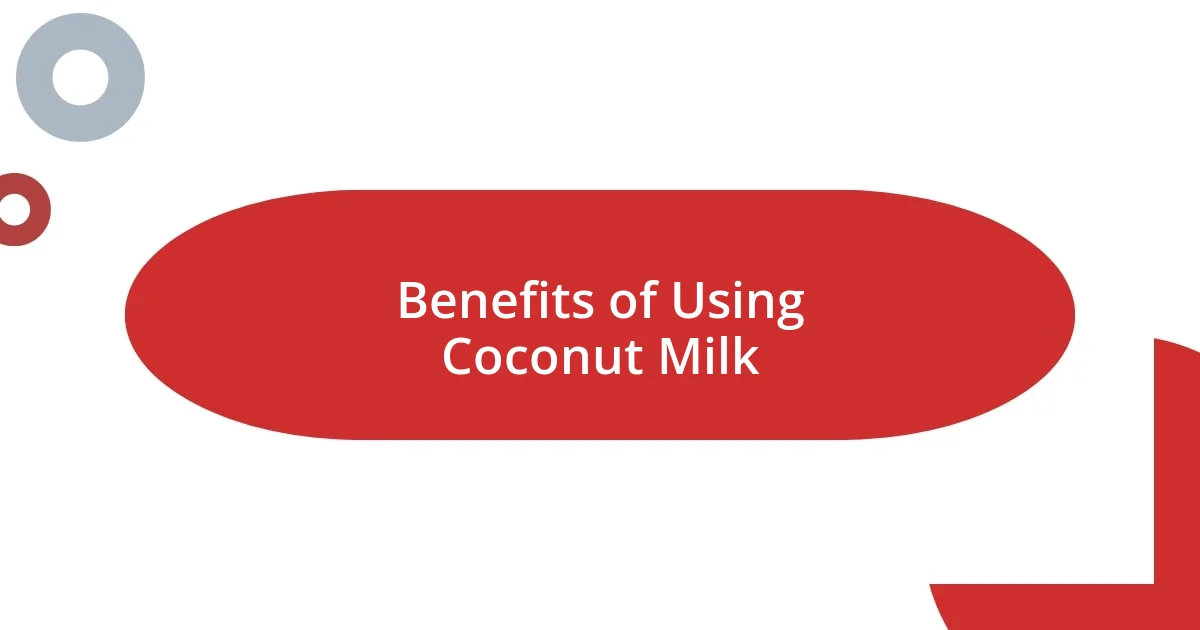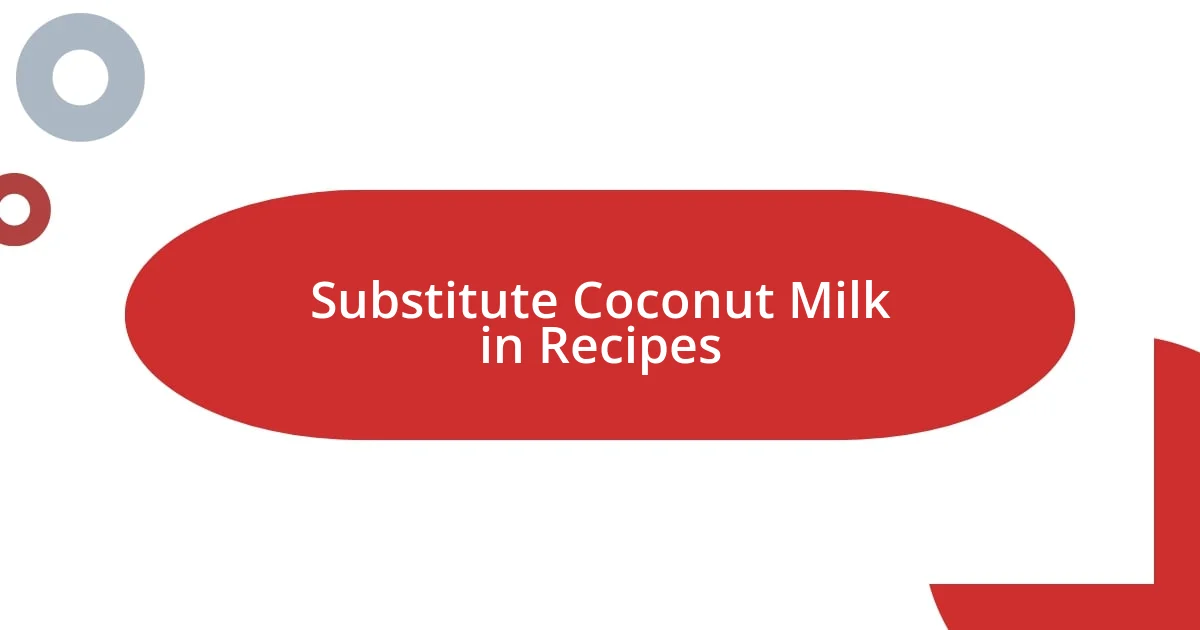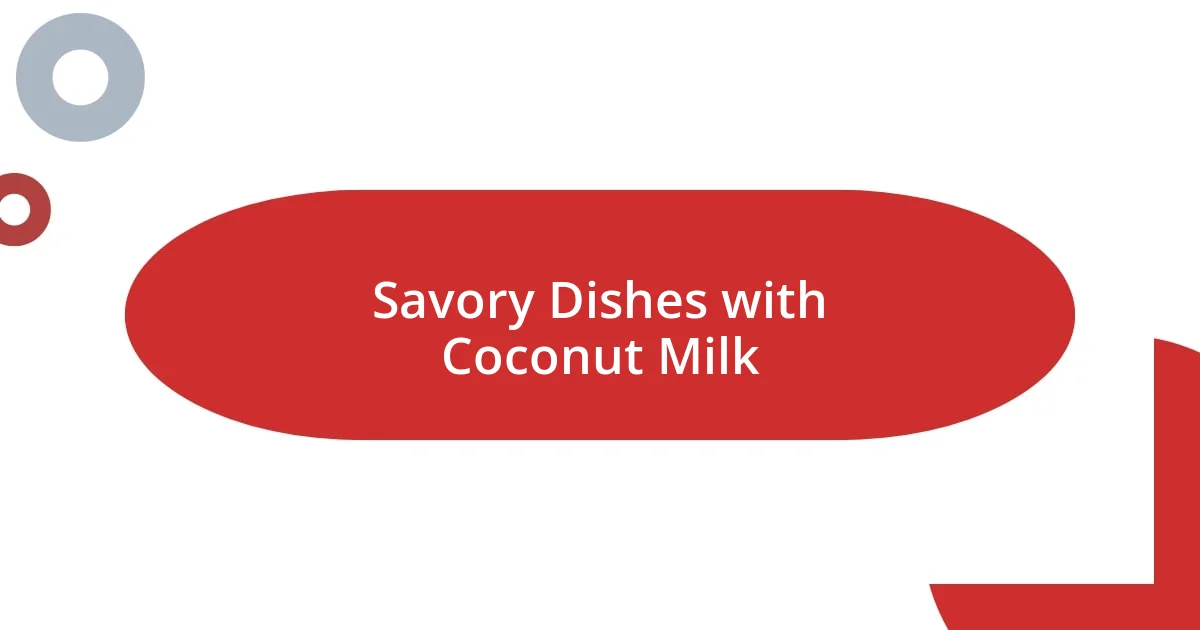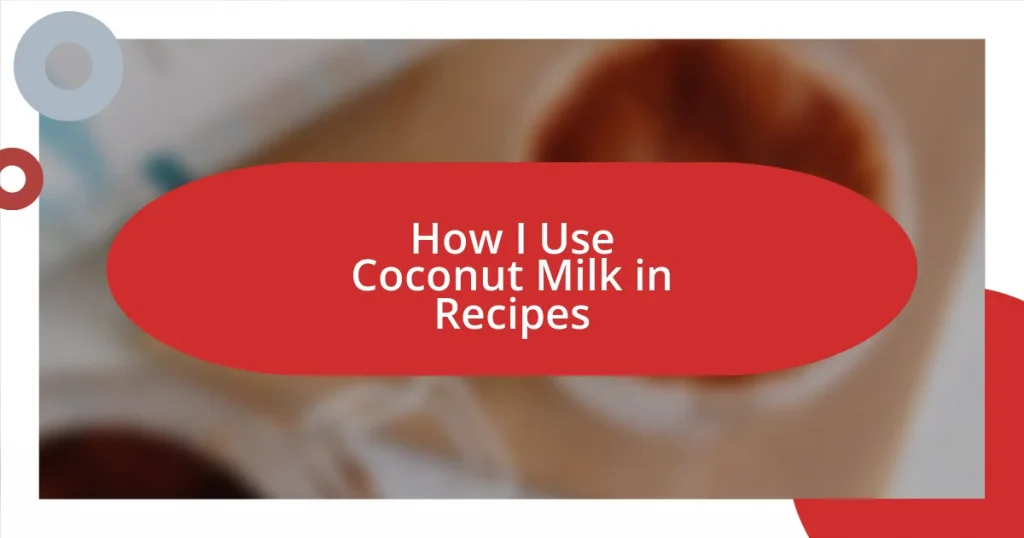Key takeaways:
- Coconut milk enhances dishes with its creamy texture and subtle sweetness, making it a great dairy alternative for those with dietary restrictions.
- Choosing the right type of coconut milk—canned for richness, carton for lightness, and organic for quality—impacts flavor and cooking results.
- Versatile substitutes for coconut milk, such as almond milk and cashew cream, can also add unique flavors to recipes while enhancing culinary creativity.

Benefits of Using Coconut Milk
One of the most delightful benefits of using coconut milk is its creamy texture, which can elevate dishes in a surprisingly simple way. I remember the first time I swapped regular milk for coconut milk in a curry; the dish transformed entirely, lending a subtle sweetness that was simply irresistible. Isn’t it amazing how a small change can lead to a whole new flavor experience?
Moreover, coconut milk is an excellent dairy alternative for those with lactose intolerance or dietary restrictions. Personally, I’ve enjoyed discovering how it complements a variety of recipes, from smoothies to soups—providing that rich, luscious taste without any digestive discomfort. It makes me wonder how many people shy away from trying new ingredients simply because they’re unsure of their benefits.
Additionally, coconut milk is packed with healthy fats, particularly medium-chain triglycerides (MCTs), which are known for their energy-boosting properties. I often find myself reaching for coconut milk when I need a quick pick-me-up in the afternoon—it not only satisfies my hunger but also fuels my productivity. Can you imagine how incorporating such a versatile ingredient can positively affect your cooking and daily nutrition?

Choosing the Right Coconut Milk
When it comes to choosing the right coconut milk, I find that understanding the different options can make all the difference in your cooking. You can opt for canned coconut milk, which tends to be richer and creamier, making it ideal for soups and curries. I still vividly recall the first time I used light coconut milk in a smoothie; it was a good choice for a lighter texture, but it just didn’t have the robust flavor I craved. Knowing this, I always lean towards full-fat coconut milk for those dishes where I want that luscious richness.
On the other hand, there’s coconut milk in cartons, which is often diluted and best used for drinking or cereal. I remember pouring it over my oatmeal one morning and feeling a bit let down because it lacked that depth of flavor I adore. This experience taught me the importance of checking the label and understanding what’s inside the packaging.
Lastly, don’t forget about the quality of coconut milk you choose. Organic options usually come with fewer additives and preservatives, which is a priority for me. I once bought a brand that promised no stabilizers, and the result was surprisingly smooth and natural in my cooking. This experience cemented my belief that good quality can elevate a meal from ordinary to extraordinary.
| Coconut Milk Type | Best For |
|---|---|
| Canned Coconut Milk | Curries, Soups, Desserts |
| Carton Coconut Milk | Smoothies, Cereal, Drinking |
| Organic Coconut Milk | Health-conscious recipes |

Substitute Coconut Milk in Recipes
When I find myself out of coconut milk or just want to play around with other flavors, I’ve discovered some great substitutes. One fantastic option is almond milk; it’s slightly nutty, and I often use it in baking to maintain that moist texture without overpowering the other ingredients. I remember once adapting a Thai recipe by using almond milk instead of coconut milk, and although it wasn’t as rich, the dish still carried a lovely flavor—just in a different direction.
Another alternative that has impressed me is cashew cream. To make this, I simply blend soaked cashews with water until smooth—it creates a luscious and creamy substitute that’s perfect for sauces. In fact, I once made a creamy pasta sauce with it, and the transformation was nothing short of amazing. It made me appreciate how open-mindedness in the kitchen can lead to delightful discoveries.
Here are some of the best substitutes for coconut milk:
- Almond Milk: Great for baking and lighter dishes.
- Cashew Cream: Perfect for creamy sauces and soups; it’s easy to make and very satisfying.
- Soy Milk: A versatile option that works in savory and sweet dishes alike.
- Greek Yogurt: Adds creaminess to smoothies or sauces, though you’ll want to dilute it a bit with water for a smoother consistency.
- Oat Milk: A wonderful vegan alternative that adds a subtle sweetness to recipes.
Experimenting with these substitutes has helped me enhance my culinary skills and expand my palate. You never know what delicious adventures await!

Savory Dishes with Coconut Milk
One of my favorite savory dishes to whip up with coconut milk is a fragrant Thai green curry. The rich, creamy texture of coconut milk transforms the entire dish, wrapping the vegetables and spices in a delightful warmth. I remember the first time I tasted it—a friend made it for me, and I was completely blown away by how the sweetness of the coconut balanced with the spiciness of the curry paste. Since then, I always include it when I cook curries; it truly takes the dish to another level.
Coconut milk also works wonders in savory soups. I love to make a creamy coconut and butternut squash soup that’s both comforting and filling. The sweetness of the squash combined with the creaminess of the coconut milk creates a harmonious flavor profile. I still recall one chilly evening when I served it to friends; their faces lit up with every bite, and one even asked for the recipe right away. It’s those moments that remind me how pivotal good ingredients can be in sparking joy around the dinner table.
Have you ever tried using coconut milk in savory rice dishes? I often replace regular broth with coconut milk in my risottos or rice pilafs, adding a unique depth that surprises everyone. It’s incredible how something so simple can change the dynamics of a meal. I remember the first time I did this; the creamy, slightly sweet taste paired beautifully with sautéed vegetables, and it became an instant hit. I love sharing this trick with others; it’s a little culinary magic that keeps them coming back for more!

Sweet Treats Featuring Coconut Milk
When it comes to sweet treats, coconut milk is an absolute game-changer. One of my go-to recipes is coconut milk rice pudding. The way the creaminess envelops the rice creates a comfort food that feels like a warm hug. I still remember making it for a special dinner with friends; as the sweet aroma filled the room, I could see their eyes light up in anticipation. Topped with a sprinkle of cinnamon and coconut flakes, it becomes an irresistible dessert that has everyone asking for seconds.
I also love using coconut milk in smoothies, especially when I’m in the mood for something indulgent yet nutritious. Blending it with frozen bananas and a touch of cocoa powder results in a creamy, chocolatey treat that feels like dessert but is actually nourishing. Did you know that adding coconut milk can elevate the flavor profile of your smoothie? I once made this for my morning routine, and I was so energized afterward that I couldn’t help but dance around the kitchen!
Another sweet delight I adore is coconut milk ice cream. It’s incredibly easy to whip up at home and can be flavored with anything from vanilla bean to fresh mango. Last summer, I decided to host an ice cream-making party, and we created an array of flavors with just coconut milk and fruits. The joy on my friends’ faces as we scooped our creations was genuinely priceless. Have you ever realized that something so simple can bring people together in such a joyous way? Coconut milk not only enhances the sweetness of my treats, but it also brings a sense of togetherness and fun in the kitchen.















